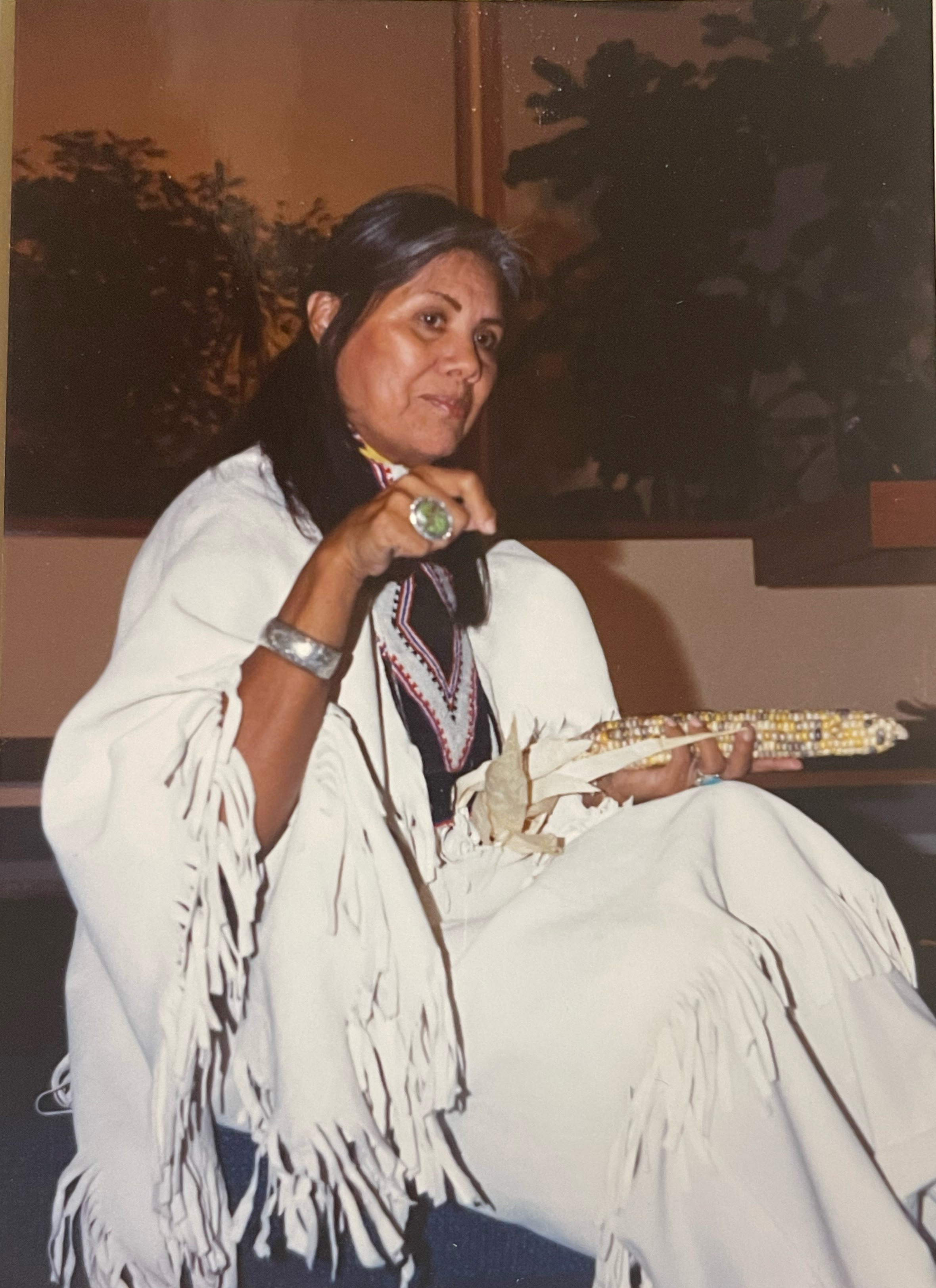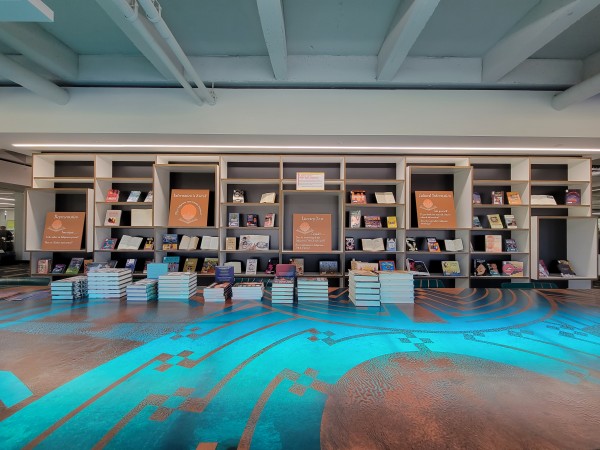Labriola Center celebrates Native American Heritage Month with events, exhibit

The Labriola National American Indian Data Center team (from left to right): Yitazba Largo-Anderson, Alexander Soto, Eric Hardy and Vina Begay. Photo by Kyle Knox
November is Native American Heritage Month, and while this annual celebration brings a heightened awareness, at ASU, the recognition does not end after the month is over.
"Here at the Labriola Center, we celebrate Indigenous peoples every day and every month of the year,” said Alexander Soto (Tohono O’odham), director of the Labriola National American Indian Data Center.
“As an Indigenous library, our staff seeks to enhance the visibility of our community through culturally relevant events, services and resources. NAHMNative American Heritage Month gives us an opportunity to further spotlight what we do for the other eleven months of the year. For us, we feel it is vital to make space and place for indigeneity throughout ASU," Soto said.
During Native American Heritage Month, the Labriola Center team is hosting a lineup of events for students, staff and community to experience.
For Yitazba Largo-Anderson, the first thing that comes to mind when thinking about the Labriola Center is community.
“At the Labriola Center, we’re about community. In the library and at our events, we invite people to come together to have conversations, be creative and center our Indigenous ways of knowing,” said Largo-Anderson, a member of the Diné nation and program coordinator on the West campus.
Working as a student librarian, Utohna Francis (Diné) connects Indigenous students to the Labriola Center's resources and events.
“My experience working for the Labriola Center has been an exciting experience filled with so much light,” Francis said. “It’s such an amazing sight to see Indigenous scholars come together, learning cultural knowledge and creating friendships. I hope students will be more mindful of tribal nations, their history and their resilience during upcoming NAHM events.”
Tempe campus events
- 10 a.m. to 2 p.m. Tuesday, Nov. 1: Native American Heritage Month Kickoff at Hayden Library with music and tabling with Indigenous student clubs.
- 4 to 6 p.m. Wednesday, Nov. 2: Jewelry Making with the Makerspace in Hayden Library.
- 6 to 8 p.m. Thursday, Nov. 3: “Powerlands” film screening at Hayden Library.
- 9 a.m. to 6 p.m. Tuesday, Nov. 15: "ASU Intercultural Well-Being: Indigenous Innovations and Design" event with the School of Sustainability at Hayden Library.
- 6 to 9 p.m. Thursday, Nov. 17: Lo-fi study session at Hayden Library
- 6 to 7:30 p.m. Friday, Nov. 18: “Run to Be Visible” film screening and Q&A with Lydia Jennings at Hayden Library.
- 7 to 9 a.m. Saturday, Nov. 19: "Knowledge from the Land Walk" at Tempe Town Lake Marina.
West campus events
- 7 to 9 p.m. Wednesday, Nov. 9: “What Life is All About” opening reception for Jean Chaudhuri exhibit at ArtSpace West.
- 6 to 9 p.m. Thursday, Nov. 17: "Beats and Beading" at Fletcher Library while streaming lo-fi study session beats.
- 6:30 to 8:30 p.m. Tuesday, Nov. 22: “100 Years: One Woman's Fight for Justice” film screening at Fletcher Library.
Honoring the life of Jean Chaudhuri at ArtSpace West Gallery
Portrait of Jean Chaudhuri. Credit: ASU Library Jean Chaudhuri collection.
This year includes a special exhibit at ArtSpace West Gallery on the ASU West campus, in partnership with the School of Humanities, Arts and Cultural Studies at the New College.
The exhibit “What’s Life All About?” celebrates Native American community leader, author and storyteller Jean Chaudhuri.
“What’s Life All About?” comes from the title of a poem by Chaudhuri, whose work highlights a central part of her life: what it means to give back to your community from an Indigenous perspective.
“Several years ago, Jean’s papers were donated to Labriola, and as we were going through them this year, I was struck by how Jean was ahead of her time," said librarian and archivist Vina Begay (Diné). "There is an incredible history of how she helped preserve the Phoenix Indian School. When a proposed land swap threatened the school being demolished, Jean organized a preservation coalition to ensure that the history of Phoenix Indian School wasn’t erased.”
Chaudhuri was a citizen of the Muscogee-Creek Nation and, in 1972, became director of the Traditional Indian Alliance for Greater Tucson and executive director of Tucson Indian Center.
An author, playwright and poet, she wrote the comedic play “Indians Discover Christopher Columbus” for the 500th anniversary of Columbus’s landing on this continent. Chaudhuri wrote the book “A Sacred Path: The Way of the Muscogee Creek” with her husband, Joyotpaul “Joy” Chaudhuri.
“Jean Chaudhuri was inducted into the Arizona Women’s Hall of Fame in 2013. This exhibit allows us to share her collection with the community, so others understand the love, passion and care she had for the Indigenous community here in Phoenix and Tucson," Begay said. "Visitors can spend time exploring Jean’s correspondence, photographs, creative writings and other programs and services that she created during her life.”
A special opening reception will take place from 7 to 9 p.m. Wednesday, Nov. 9 at ArtSpace West gallery that will feature readings from Chaudhuri’s family. The installation is free to the public and open until Nov. 23.
Books that engage with Indigenous scholars and authors
The Labriola Center’s collections provide resources to support student and faculty academic success, including the preservation and curation of Indigenous Knowledge and awareness.
“We offer collections at both Hayden Library and Fletcher Library for everyone to explore,” Largo-Anderson said. “You can find contemporary books written by Indigenous authors and artists, including poetry and fiction as well as some remarkable zines and graphic novels in our collection.”
During the fall, two book displays will be highlighted. At Fletcher Library, a display dedicated to the issues and advocacy of Jean Chaudhuri will be located on the first floor.
At Hayden Library, visitors can find the “Information is Sacred” book display on the second floor next to the O’odham Storytelling Table. Created for the state of Arizona’s Office of Indian Education Indigenous People’s Day symposium, the display guides visitors through a series of questions to interact with the books on display.
“Information is Sacred” book display on the second floor of Hayden Library. Credit: Labriola Center.
“The expression ‘Information is Sacred’ comes from the Labriola Center’s mission meaning that Indigenous knowledge is important to our communities and our cultural values. Whether art, music or text, these should be treated with respect,” Largo-Anderson said.
The staff and team of student librarians will continue to grow and share more exciting events and initiatives.
“Community building through cultural resiliency is at the center of what we do at the Labriola," program coordinator Eric Hardy (Diné) said. "Our staff and student staff strive to create community safe spaces that resonate culturally with the ASU’s Indigenous students and community. Our events and activities serve as entry points into our community. Come to our events and activities to learn more about what we do, and follow us on our social media platforms.”
The Labriola Center is located at Hayden Library on the Tempe campus and Fletcher Library on the West campus. To stay up to date with events and news, visit the Labriola Center website.
More Arts, humanities and education

‘It all started at ASU’: Football player, theater alum makes the big screen
For filmmaker Ben Fritz, everything is about connection, relationships and overcoming expectations. “It’s about seeing…

Lost languages mean lost cultures
By Alyssa Arns and Kristen LaRue-SandlerWhat if your language disappeared?Over the span of human existence, civilizations have…

ASU graduate education programs are again ranked among best
Arizona State University’s Mary Lou Fulton College for Teaching and Learning Innovation continues to be one of the best…



